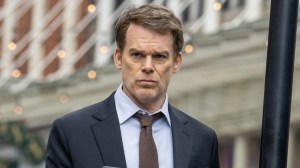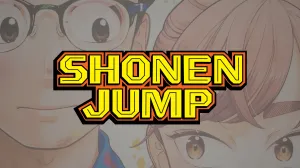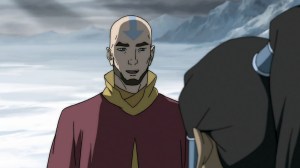Both Joshua Hale Fialkov and Tony Fleecs spent a lot of time at video stores over the years.
Videos by ComicBook.com
And not just in the “hey, these guys have a five VHS tapes for five days for $5.00 special. Let’s go check it out” way. They worked at video stores — plural, in both cases — for years.
That significantly informed their Oni Press series, Josh Steinberg: Champion of Earth, the second issue of which comes out tomorrow. The concept is that the title character, a slacker who works at a video store managed by his girlfriend, is chosen to represent Earth as a last line of defense against alien invaders — because his will was the most focused and indomitable on the planet at the moment a champion was being sought out.
Of course, that’s only because he was really, really focused on trying to have a bowel movement. It’s that kind of book.
It’s also hilarious, clever, and full of pop-culture references that nerds and middle-aged video store guys alike will appreciate (as the writer of this article can attest).
You can check out our talk about Josh Steinberg: Champion of Earth below. If you want to hear the whole, uncensored conversation, you can listen at the Emerald City Video Podcast. The conversation starts at about the 80-minute mark.

First off, why a video store now?
Joshua Hale Fialkov: Tony, I’ll let you handle this one!
Tony Fleecs: Well, we wrote this several years ago, and at that point, Netflix was just trying out this thing where you could watch videos on demand at home. It hadn’t really taken off yet. So we really dug in, having both worked at video stores, and decided we were going to have him work at a video store — and then in the time that it took me to draw the thing, video stores became extinct.
Fialkov: So it went from being sort of a ha-ha job to an absurdist job, like a dada job.
The first issue revolves around this very unique way in which he’s chosen for exerting his will. First of all, I feel like Josh has done some Lantern-related stuff. Was this started before or after that?
Fialkov: Before.
Fleecs: This was your Green Lantern story, and then you almost got to do a Green Lantern story.
Fialkov: Pretty much. That’s the deep, dark secret: I got fired because my whole story was that I introduced a new Green Lantern, and he was very constipated. End of story.
Fleecs: Oni originally wanted us to kill the black guy also…but then we just forgot to put the black guy in.
Fialkov: We’ll get to it, though. We’ll do it!
That was part of it. The thing for us is that we’ve been best friends for like ten years. We have our conversations — these weird, free-flowing, sarcasm-laced, reference-filled, obnoxious patois.
Fleecs: They kind of dip back and forth between talking about movies and talking s–t about people, and then they slip back into movies in one constant stream of consciousness.
Fialkov: Yeah. Things we love and things we hate — and sometimes things that are both. And so we wanted to do a book that was like that. And I think part of why he works in a video store is, that’s sort of the tone of the book is what it’s like working in a video store.
I worked for Tower Records during kind of the great compression. Literally we would just stand there watching movies and talking s–t because there was nothing else to do — and everyone there had their dream. Everyone had their dream of what they should be doing and how, if they could just get out of this evil corporate teat, they’d be set and made. The book is sort of channeling that attitude.
When we sit down to write it, it’s how we write it. When we’re going through after Tony draws it and we’re doing a joke pass, we’re just talking about what we think is funny.
So we’re really doing a book for just the two of us, which is very convenient, as we get it for free. It’s sort of a s–tty business model.
Josh, you’ve got a ton of books going on right now, but I feel like when you’ve got something that’s been in the background for years finally getting made, it has to be a huge relief — not to make any inadvertent constipation jokes…!
Fialkov: No, it’s nice. I’m really proud of this book. What I do, I don’t know that it’s changed that much at all. I’ve always done lighter stuff as well as darker stuff, and then in the past five or six years, I’ve moved much more into the darker stuff. So this year getting to do both Jeff Steinberg and then King, which I did for Jet City, which is also a weirdly light-hearted book, it’s been fun to kind of get back in touch with that. Writing The Bunker and writing The Life After, I think the books are both very pleasurable to read but they’re hard to write because they’re about what’s wrong inside of people’s souls.
Whereas this is a bunch of fun dick jokes around a pretty likable character, I think.
When you’re developing a series, you get kind of stuck with these things forever. Terry Moore has talked very openly about how Rachel Rising was so dark that he needed something next that doesn’t make him want to kill people.
Fleecs: Yeah. This is the something that doesn’t make us want to kill people. It’s a delight, it’s fun. Even the hours and hours it takes to draw it are not painful hours because it’s doing exactly what you want to do. We came up with the concept of these characters together; Josh came to me with an idea, and said “You know how Green Lantern gets chosen by willpower? What if there was a guy who was just constipated for like three weeks, and he’s finally taking the s–t, and that’s when he gets chosen as the Green Lantern?”
And that’s sort of where it sprung from. Obviously we didn’t go full-on Michel Fiffe and just do a Green Lantern book, but coming up with the characters after that — okay, who’s this guy and what’s his world? All the characters that we came up with are exactly how I want them to look and exactly the attitudes — we built the world around the guy that’s really fun to draw.
Fialkov: And what Tony’s good at as both a writer and an artist is talking to characters in a way that’s earnest but not in a s–tty way. It’s very heartfelt and everyone feels very real.
Do we have any idea where this book takes place? There are still, theoretically, video stores that exist?
Fialkov: I think it’s Boston, and Tony, I suspect, think it’s Colorado.
Fleecs: Right. I drew the apartment from Denver, because that’s where I worked at my video store.
Fialkov: And then I described Boston, and the video store that I worked at. So we come out in the middle — which is like Indiana. That’s roughly in the middle.
Fleecs: But yeah, it’s Everytown USA. It’s an American, medium-sized city.
The alien race themselves being so entertaining reminds me a bit of Keith Giffen and J.M. DeMatteis’s Hero Squared, which I always really enjoyed.
Fleecs: Yeah, me too.
Fialkov: Yeah, there’s not a wide berth of really funny comics in the long history of comics, but the stuff that is funny — especially their stuff — is so goddamn hilarious, and it’s a lot of what we want to do. That stuff is borderline absurdist, but at the same time has heart and it has character.
Fleecs: And Hero Squared is almost surgical in its setup – punchline – hit you with the emotional punch. They had it mapped out — here’s where this happens, here’s where this happens, and it always lands right where it’s supposed to land. That book’s great.
Fialkov: Marc [DeMatteis] is indirectly responsible for large chunks of my career, because he created I, Vampire, which is the book that dropped me down the deep, dark well of DC Comics. And he did Brooklyn Dreams, which is one of the best comics ever made. My book Tumor owes a lot to Brooklyn Dreams. The style of it and the way that he kind of merges reality and dreams.
Are you guys coming out semi-regularly, then?
Fialkov: We’re going to once every seven years is the plan!
No, we just finished the third one. The first six issues are all drawn.
Fleecs: We’re going through and adding stuff here and there, to sort of round it out a little bit. When we do the lettering pass, we see spaces where we could use stuff. While my schedule is a little crazy, I can manage to get two pages a month done for something when I have the rest of the book drawn so I’m throwing new stuff in and mixing it up with the not-as-new stuff.
Fialkov: And then hopefully we’ll be doing it for a little while more after those six. We know what the story is and we have the whole thing mostly planned out. The weird thing is, they start using the Internet in one of the issues — they’ve never heard of the Internet before. So we have to redo that stuff. That’s not going to work.
And then Obama’s going to be done soon, so we’re going to have to redo that. And we might want to wait and see what happens so that we’re writing with the right crazy person in office.
Fleecs: It’s going to suck having to write a book about an idiot who’s in charge of our whole destinies if there happens to be an idiot in charge of our whole destinies.
In the time that you have been working on this, the ’80s and ’90s have really started to be fetishized in popular culture.
Fialkov: Yeah, I think Stranger Things really came out to our benefit. We’re doing a book that’s for those kids.
And you’re not explicity mining those nostalgia, but it’s baked into the DNA with the video store.
Fialkov: I will say one of our chapters in the second issue is called “Mac and Me.” So we are.
Fleecs: The book lives in a world where references to that sort of thing isn’t a wink-wink, nudge-nudge. It’s just, obviously we know about The Karate Kid or Mac and Me or Rocky IV.








